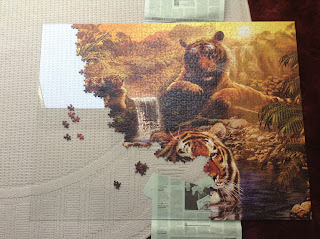My goal was to put really large puzzles on the wall. "Industrial" solutions are both expensive (~10K HUF) and inadequate (frame falls apart without further wiring on the backside).
The main idea is to put the puzzle between a glass and a fiber-board, and clamp them together.
The key is the "clamp" that binds the glass to the fiber.
I took those "clips" from small, ACME frames that work the same way: those 9*12cm "frames" cost ~300HUF a piece, and contain 4 clips; you need 2 or 3 of those clips in one side for bigger pictures.
I tried to get those tiny frames in Creative shops first, but only found 3 pieces of those in 2 shops, as their stock is very low.
Later realized that Auchan sells an even greater variety of those in lower price (~250 HUF), and has bigger stock.
What did I do?
1. Took the clips from those frames. For the little African picture, I needed 6 clips (1 on each side, except from the bottom, where I put 3 clips); for the bigger picture, I needed 10 (3 on the longer sides, 2 on shorter ones)
2. I put holes on the backside of the fiber-boards the same manner as the tiny frames had those:
First I used the yellow cutter on the picture to "dig" the holes, then realized that small chisels do a faster work, with a bit more noise.
3. You need something to hand the whole picture to the wall. I've found these needle-included hooks to be the best; unfortunately I ran out of them:
3. Put the puzzle on the board, cover it with the glass, and clamp it together.
4. Put nails or screws into the wall where you hang the picture. Mind that it can be really heavy (so screws are advisable), and mind that the picture is leveled.
5. Enjoy!
Advantages:
* Costs about 20-30% as ACME solutions in this size
* Surprisingly, it is more stable than frames of these sizes
* You can work with any size, not only standard sizes like 70*100cm
* Easier than it looks. Once you get the hang of it, you can assemble the whole stuff within an hour.
Disadvantages:
* Glass cuts, and reflects, and is heavy. I used 2mm glass, that is really fragile in this size. And is still heavy. Mind what you're doing: If the picture falls on you, IT CAN KILL YOU!
Maybe you can use plastic instead of glass - more expensive, but lighter, safer. If you have something that doesn't fall apart like a puzzle, you can safely omit the glass.
* Mind the exact sizes of the fiber, glass, and the picture. They should match almost perfectly: if you have a difference more than 3mm, you're in trouble. For the African picture I had to use heated glue to fix the glass to the clamps, as the glass is too short.
Sidenote: Don't underestimate the work in drilling holes on the wall. These tools can tell the tale:





No comments:
Post a Comment